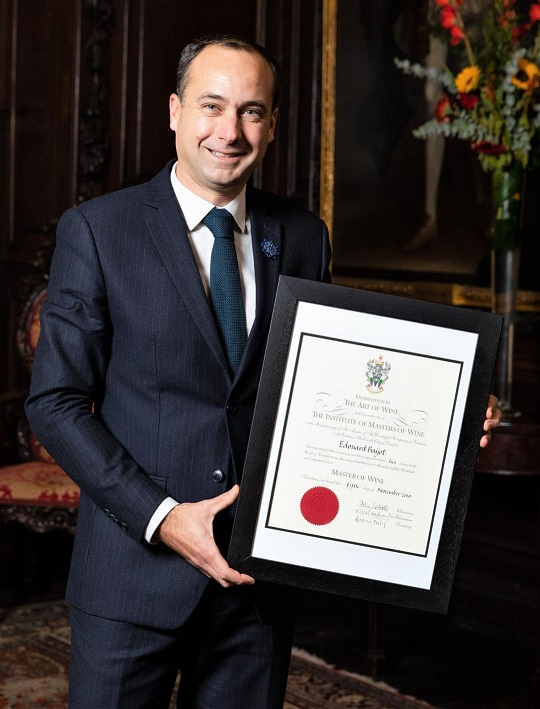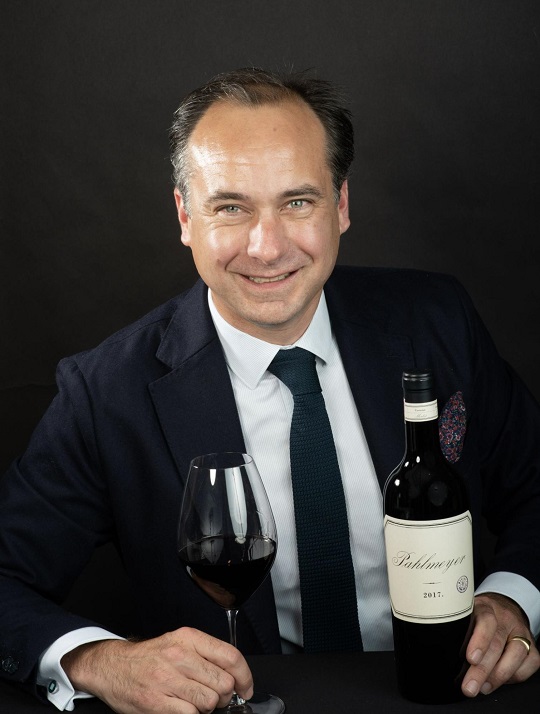Super Early Bird Ends
30 April 2025
Warehouse Deadline
30 Sep 2025
Judging Dates
7 October 2025
Winners Announcement
28 October 2025

Edouard Baijot MW is the Director Luxury – International for the E&J Gallo Winery. He has been working in the wine industry for 22 years.
I was born in Reims and grew up in the famous Côte des Blancs in Champagne, so I started my wine journey when I was a young man walking or riding with my horse in the vineyards. At school most of my friends had a close connection with Champagne and at a very early age I was both intrigued and fascinated by the industry.
After I graduated with a Master of Science in Management from IÉSEG School of Management in Lille, I completed a first internship of 6 months at Veuve Clicquot in Reims. I entered the wine industry in 2002 when I joined the E.& J. Gallo Winery in France. I started as a Sales Representative for Brittany where I embraced the challenge of selling Californian wines to the French! Fast forward twenty-one years and several promotions within the company, I now head-up the Luxury Business for the company’s International Division (which basically accounts for every country outside the USA).
I completed my WSET Diploma in 2010, became a WSET Certified Educator in 2014 and a Master of Wine in February 2019.
The title of Master of Wine is certainly my most significant professional achievement and one that I am most proud of. I spent more than 6 years studying the syllabus and building my database of examples from all over the world, as well as training myself to taste blind. The Master of Wine journey has significantly developed my knowledge as I learned much about topics I did not really need for my professional job. At this time, I was mainly dealing with large retailers so even if most of these businesses had a deep understanding of our industry, it was rare to discuss such topics as enzymes, pH or rootstocks during our meetings. I dedicated many hours/days and weeks studying winegrowing and winemaking. I believe I have a natural affinity for viticulture as I grew up in the countryside and my grandfather was a farmer – I think this is in my blood!
Being a Master of Wine also gives you the opportunity to access an outstanding network of key influential people in our industry. It opens doors and creates business opportunities. Naturally becoming an MW has developed my confidence, and I am feel assured of my knowledge and understanding of what can often be a complex industry. However, I fervently believe that continuing to adopt a ‘student of life mindset’ allows me to continue to grow and develop, I still believe that I am at the beginning of my learning journey.
Becoming Master of Wine is very time intensive and requires huge commitment and a strong work ethic, so if you are not ready to dedicate hours and energy to the program, you will waste your time and your money. It is also very important to build a proper plan which fits with your personal and professional life. There is no ‘one way’ to become a Master of Wine and each student is different so don’t focus on others, particularly those students who give you the impression they know everything, capitalize on your own skills. Never give up and carry on!

During the first fifteen years of my career my job was mainly to develop commercial brands in retail and I was working with large grocery chains such as Leclerc or Auchan in France, Carrefour and Colruyt in Belgium and Jumbo and Albert Heijn in the Netherlands. The discussion was mainly about price and activation programs, shelf schematic arrangements and visibility in promotion. I learned a lot, but I knew it was not the vision I had for my career and that’s the reason I decided to dedicate a lot of time to learning about wine. I was determined to understand not just the commercial side of the industry, but the wine itself.
Fortunately, the timing was perfect as E&J Gallo Winery was transitioning into the premium wine category and the Gallo family were making significant investments to build a portfolio of fine wines, which is still growing today. I shared my project and my vision with leadership at Gallo, and they gave me the opportunity to build a team to focus on Super Premium Wines which has now developed into Luxury wines.
As a traditional producing country France is, of course, dominated by French wines which represent more than 95% of the offer but one of the biggest differences is the size of the wine section and the number of wines available. The share of rosé and bag-in-box are also something unique to French off-trade even if Nordic monopolies have more than 50% of their volume sold into this format. Negotiations with grocery buyers were often difficult, particularly for me as I was selling wines they did not really need on shelf. Indeed, I was pushing more than I was selling and some discussions were hard. Now, life is a little easier when I talk about wine...
“Foire aux Vins” is also something unique to the French off-trade and even if I don’t buy wine in retail everyday, I always purchase during wine fairs on products I carefully select in advance. The retailers I particularly like for wine fairs include Monoprix and independent chains such Leclerc, Système U or Inter.
When I was a sales representative at Gallo we had 10 steps to follow when we were entering a store, these incorporated a standard of personal performance and standards for the shelf, I still have these in mind today. The most important to remember was to be at the right price, be placed at eye level with more space than competitors and get POS materials such shelf-talkers to drive consumer attention. I was also used a duster to do my housekeeping and keep my bottles clean. I still believe these standards are key, particularly in stores where staff are not available to assist or provide advice.
France is a traditional, mature market where consumption is declining year on year. However, it remains the second largest market in the world by volume and opportunities always exist. French consumers have more and more education on wines and are becoming more curious about new countries and regions and that’s particularly something we notice with online buyers. When I was managing France, I sold more than 1 million bottles each year on the market but today my advice would be to focus more on premium business with a more exclusive distribution and better margins. I would also be mindful of the fact that French consumers are also looking for “la bonne affaire”, the bottle you will share with friends at a decent price.
I would recommend wines with a ‘sense of place’, a nice story to share. Offering good value for money with a price below 20 euros is also a sound strategy.
I like wine which expresses both a sense of place and the personality of the “vigneron”. I like wine with verticality rather than wine with rich structure and artifice. I am from Champagne, a cool climate region so I like acidity, freshness and minerality with good potential for ageing. I am also very versatile, and I never drink the same bottle two times in a row, except if I have not finished the bottle!.

However, if I have to make a choice for whites I have strong affinity with Chenin from Loire Valley, Riesling from Mosel and Rheingau or Savagnin from Jura. For Reds, Cabernet Franc also from the Loire, Syrah from Côte-Rôtie, Nebbiolo from Piemonte or Nerollo Mascalesse from Sicily. As you can imagine Champagne is also on my favorites and I don’t have any single week without having a glass or more as it is part of my DNA. My personal cellar is mainly built from four countries/regions : France, Italy, Germany and California. I have a nice collection of Bordeaux and Bandol reds which are two regions I particularly love.
The definition I use for Luxury is the one defined by Peter Yeung and Liz tach MW in thebook they published in 2019 Luxury Wine Marketing which is the following: Luxury wine is of the highest quality, coming from a special place on earth, has an element of scarcity, an elevated price, and provides a sense of privilege and pleasure to the owner.” It is most important to differentiate luxury wines and Fine Wines which are not exactly the same. Luxury is defined by an elevated price, usually above 100 euros a bottle but a fine wine can have all the attributes of a luxury wine with a much lower price. The wines from Jacky Blot in Montlouis as an example are not luxury wines but are definitely ‘fine wines’. A producer in Champagne such Legras & Haas is not a luxury producer but their wines provide pleasure, have a strong sense of place and are outstanding in quality. Route to market will differ for both luxury and fine wines. The diversity of our portfolio at E&J Gallo gives us the opportunity to offer both fine wines and luxury wines.
The demand for premium or luxury wines will continue to rise for the following reasons:
1. Costs are rising on all segments of the value chain and in many regions it will not be profitable anymore to produce entry-level wines so the trend for producers is definitely to produce better wines at a more expensive price so the offer will ultimately change.
2. The emerging markets are growing with new, large countries, notably on the East side of the world, showing interest in wines. In these markets even the consumer base is still low, the number of wealthy consumers who would like to have access to wine is high and will put pressure on demand.
3. In mature markets consumers drink less but better, with often more education about the product. In these markets the demand for fine wines will continue even if macroeconomic trends impact short term consumption.
I would say that education and passion are key for people who would like to work in the luxury category. You should be able to share stories with consumers, explain about th practices and inspire consumers desire for wines. It is important to share the artistry behin each bottle, be transparent about the practices be cautious about the environment as sustainability is critical for the next generation. Each market is different, so it is also important to learn about local habits and build a portfolio which fits with luxury consumers’ expectations in each region.
Continue to explore the diversity of wines and keep discovering new markets and consumers. Continue to share my passion and serve joy by helping people discover new and beautiful wines. Afterall wine is the most exciting agricultural product we as humans have ever Created!
Interviewed by Stuti Khetan, Beverage Trade Network